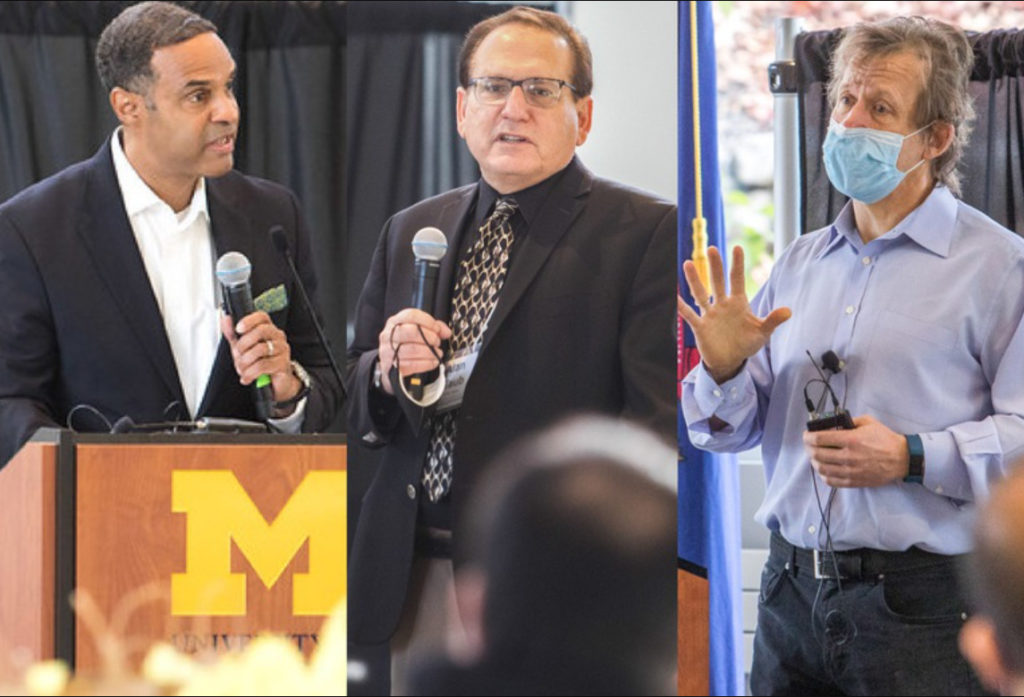
Successful MMRI symposium takes on 21st century challenges
Eleven faculty and external speakers presented on their domains of materials expertise and visions for the future.

Eleven faculty and external speakers presented on their domains of materials expertise and visions for the future.
From lithium-ion batteries to tissue engineering, the Michigan Materials Research Institute’s first-ever Symposium showcased just how ready MMRI is to tackle the planet’s greatest threats.
“As we enter into the heart of the 21st century, we face existential challenges pertaining to climate change and the finite resources of our planet, as well as our vulnerability to disease and natural threats,” said MSE Assistant Professor and Symposium organizer Ashwin Shahani in his opening remarks. “Today’s Symposium presentations will address some of these challenges with new technologies and with new materials with exotic functionalities. They will also highlight the wealth of opportunities for future generations of materials scientists and engineers.”
The event kicked off at NCRC with a student poster presentation on November 9 with 50+ graduate researchers participating, followed by a virtual keynote address by Arizona State University’s Alexandra Navrotsky titled, “Materials Science – What’s New and Exciting in the Universe.”

In his opening remarks the next day, Michigan Engineering Dean Alec Gallimore praised the MMRI as having “transformative potential [for Earth’s sustainability] that is exciting and undeniable.” He commented that the Symposium “is about plotting a course to a bright, sustainable and just future.”
Eleven select U-M faculty and external speakers then presented on their domains of materials expertise and visions for the future, including:
Stephen Forrest – U-M Electrical Engineering and Computer Science – “Thin film conformable electrons based on epitaxial transfer,”
Becky Peterson– U-M Electrical Engineering and Computer Science – “Scalable Atomic Layer Deposition for P-type and N-type Oxide Semiconductor TFTs,”
Amit Misra– MSE – “Mechanical Behavior of Hierarchial Metallic Nanocomposites,”
Chinedum Okwudire&Wenda Tan – U-M Mechanical Engineering – “Physics-based and data-driven modeling and control of process and microstructure in metal AM,”
Elizabeth C. Dickey – Carnegie Mellon University Materials Science & Engineering – “Electroceramics for Energy Storage and Conversion: Design and Control of Defect-Mediated Properties,”
Stephen Maldonado– U-M Chemistry – “Electrochemical liquid phase epitaxy of Hyperdoped Crystalline Si,”
Paul V. Braun – UIUC Materials Science & Engineering, Self-Assembly & Energy – “Opportunities in Solid-State Batteries Enabled by Dense and Crystallographically Controlled Cathodes,”
Katsuyo Thornton– MSE – “Material Genome Approach to Enable Breakthroughs in the Fast-Charging Performance of Li-ion Batteries,”
Nicholas Kotov – U-M Chemical Engineering – “Emergence of Complexity in Chiral NanoAssemblies,” and
Kenichi Kuroda– U-M Dentistry – “Biomaterials and Tissue Engineering.”
In all, more than 120 people registered for the Symposium representing an array of disciplines in addition to MSE, including: mechanical engineering, electrical engineering and computer science, civil and environmental engineering, macromolecular science and engineering, chemical engineering, nuclear engineering and radiation sciences, physics, and dentistry.
“The symposium exceeded my expectations,” Shahani remarked. “MMRI achieved its goal in uniting materials scientists across the various disciplines. For this reason, I hope the symposium is a long-standing tradition.”
The MMRI was launched in 2019 under the leadership of founding director and MSE Professor Alan Taub. The Institute serves as a catalyst and hub for materials research, bringing together disciplines and driving collaboration between faculty, industry and federal agencies in an effort to facilitate and expedite breakthrough developments in materials science. A major goal of the MMRI is to create a more cohesive community among the materials researchers across the campus, which the Symposium embodied. Taub noted, “The topics covered by the speakers in the Symposium were very broad, but all of the presentations were easy to follow because we all build our research on the same fundamental principles of materials science.”